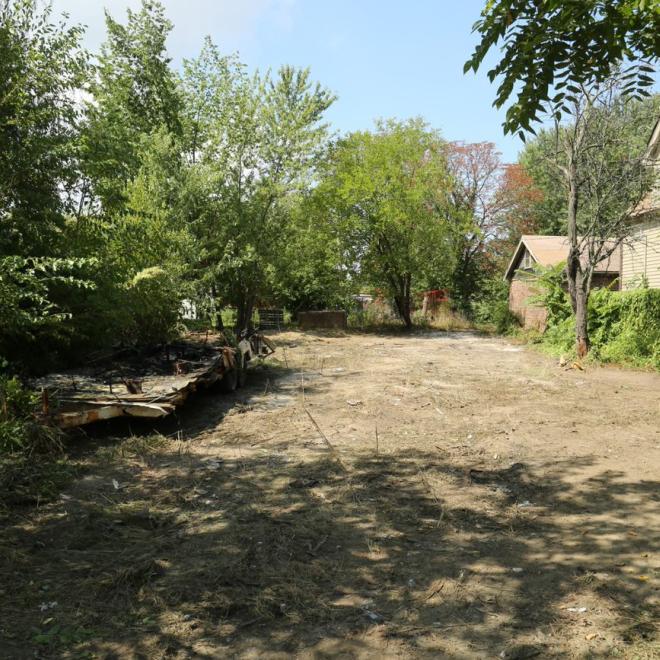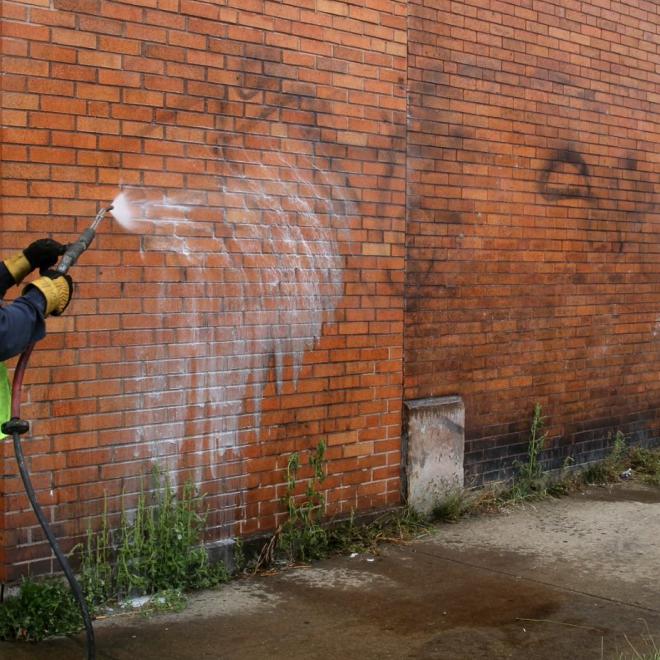Weather permitting, the Division begins cutting grass and weeds on City of Cleveland-owned vacant properties during the last two (2) weeks of April. The objective is to keep vacant properties within the City aesthetically pleasing while eliminating health and safety hazards through the removal of debris from vacant lots and structures.
The Division systematically proceeds through the 17 wards within the City of Cleveland. After the completion of the first cycle of cutting vacant properties and structures, the process is resumed for at least two (2) more cycles over the course of the summer.

Vacant Lots
Using industrial-strength tractors, crews cutting grass and weeds proceed through the main and side streets of each City ward, systematically cutting vacant lots owned by the City of Cleveland. A hand crew follows behind the tractor within a few days, ensuring that any trimming is done and any remaining debris are prepared for pick-up.
If, while inspecting, it is determined that a vacant lot is privately owned and needs to be cut, the city will cut that lot and invoice the owner for services.

Vacant Structures
Comprised of workers with industrial-strength lawnmowers and trimmers, crews proceed along a systematic cycle, ensuring that tree lawns and both front and back lawns of city-owned vacant properties are landscaped.
If, while inspecting, it is determined that a vacant structure is privately owned and needs to be cut, the city will cut grass and weeds surrounding that structure and invoice the property owner(s) for service. Like the Vacant Lot crews, Vacant Structure crews also prepare debris picked up at the work location for pick up.
Protesting Charges
Annually, a Legal Notice is published advising owners, operators, and persons in possession or control of vacant parcels of the requirements of the City of Cleveland Codified Ordinances Chapter 209. For further information, read the Annual Notice below and read Chapter 209.
Consistent with Chapter 209, a privately owned vacant structure/lot that has been cut will receive an invoice for the services rendered. The property owner must pay the invoice or protest the charge(s). To protest the charge, the property owner(s) must complete the protest form found on the back of the invoice within 10 days of receiving the invoice, then deliver the original copy and any supporting documents to:
Division of Park Maintenance & Properties
4th Floor
500 Lakeside Ave.
Cleveland, Ohio 44114
Once the protest is received, the investigation is started. Contingent upon the content of the protest and whether or not associated documents are provided, the protest can be granted, denied, or adjusted. A granted protest means the charges will be removed in full. A denied protest means that the charges on the invoice remain as-is. An adjustment means that the invoiced charges may be reduced based on the information that has been provided.
If the protest is denied, a Hearing Form will be sent to the property owner(s) along with the Denial Letter. An in-person hearing may be granted to allow a property owner(s) to bring any documents that may dispute the invoiced charges. The property owner(s) will receive, in writing, a hearing date which will be scheduled for 30 or more days into the future. If the property owner(s) does not attend the hearing or the information they provide is insufficient, the protest is denied.
After a Hearing Denial Letter is issued, the parcel owner(s) has 30 days from the decision date to file an appeal with the Board of Zoning Appeals (BOZA). To request an Appeal of a Denial Letter, contact BOZA at 216-664-2580.
2025 Annual Notice of Property Owner Responsibility and Remedial Order: Property Nuisance Abatement Program
All owners of vacant lots, land and structures in the City of Cleveland must maintain their property free of high grass, weeds, refuse and other nuisances throughout the year.
This notice is to all property owners who own vacant lots, parcels, land or structures in the City of Cleveland. (This includes side and rear lot parcels adjacent to residences). This notice is to alert property owners of their responsibility to maintain their property free of noxious weeds, high grass, surface water, refuse, litter or nuisance conditions. This notice also constitutes an order to owners of vacant lots, land and structures to maintain their property free from such nuisances immediately upon their occurrence throughout the year. The following conditions have been declared by the Council of the City of Cleveland to be nuisances because they provide harborage and breeding grounds for pests or are otherwise conducive to the creation of human health problems:
- Grass over eight (8) inches in height;
- Noxious weeds including Russian, Canadian, common, or musk thistle; shatter cane; Johnsongrass; wild lettuce; wild mustard; wild parsley; wild parsnip; wild carrot; giant hogweed; ragweed; wild plants that can cause skin reaction upon contact or produce or aggravate hay fever, asthma, allergic respiratory reaction, or similar conditions; and all other noxious weeds, including those listed as prohibited noxious weeds in OAC 901:5-37-01, as it may be amended;
- Refuse including trash, junk, garbage and food waste, offal, animal wastes, tires, and all other waste materials;
- Stagnant surface water.
The owner, operator, or person in possession or control of a vacant lot, vacant land or structure in the City of Cleveland must remove or otherwise abate any listed nuisances no later than thirty (30) days after the publication of this notice, and immediately thereafter throughout the year. If any nuisance on a vacant property is not abated as required by this notice, the City will take one or more of the following actions beginning thirty days after this notice is published:
- The City may take any action necessary to abate the nuisance and to bill the owner of the property for all costs of abatement. You will have the opportunity to appeal the bill.
- The City may ticket the owner, operator, and/or person in possession or control of the property. Such person is subject to a fine of up to $150.00.
- The City may take other civil or criminal legal actions.
You may appeal this notice and remedial order within ten (10) days after publication, by writing to:
Commissioner of Environment
Cleveland Department of Public Health
75 Erieview Plaza, 3rd Floor
Cleveland, OH 44114
Tel: (216) 420-7957
NOTE: The City of Cleveland makes no inference by this notice that any vacant lot, land or structure owned by you is not properly maintained and cared for at the present time. The City of Cleveland appreciates all efforts by property owners to maintain and improve vacant lots, land and structures within our City limits.
Occupied Structures
Vacant Structure crews do not service occupied structures. If the grass has grown to a level that could be a safety or health violation, it is referred to the City of Cleveland Department of Health for inspection.
For questions about the Vacant Lots and Vacant Structure operations, contact the City of Cleveland’s Citizen Support Specialists by dialing 3-1-1 (within the City of Cleveland city limits) or 216-664-2000 for assistance.